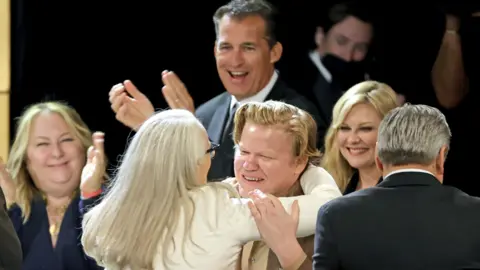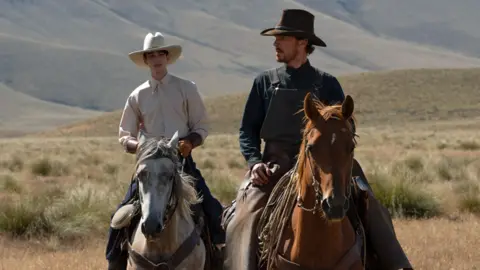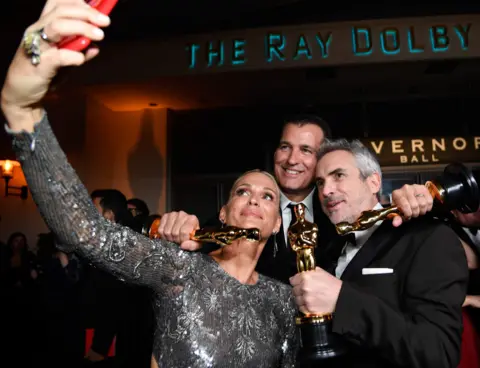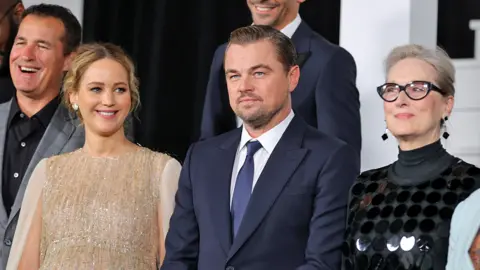Netflix boss Scott Stuber says Oscar best picture win would be the dream
 Getty Images
Getty ImagesA streaming service could win best picture at the Oscars for the first time on Sunday, which Netflix's head of global film Scott Stuber says would be "the dream".
"We all grew up wanting that," Stuber says in his first UK broadcast interview. "We are all going into the room with that hope and dream. Can you make a film that will be considered best in class?"
Netflix, once the new kid on the block, has 27 Oscar nominations at this year's Academy Awards, more than any other studio. The Power of the Dog, the story of two warring brothers set in 1920s Montana, is one of the frontrunners to be named best picture.
Its director, Jane Campion, is also nominated for best director, and its stars Benedict Cumberbatch, Kodi Smit-McPhee, Jesse Plemons and Kirsten Dunst are all up for acting awards.
 KIRSTY GRIFFIN/NETFLIX
KIRSTY GRIFFIN/NETFLIXNetflix has never won best picture, despite previous nominations for Roma, Mank and The Irishman. This year, it faces competition from another streaming giant, Apple, whose film Coda is also hotly tipped.
Stuber, often described as the most influential man in Hollywood, told me: "I'm nervous. You never know what's going to happen in that room. It would be thrilling, it would be exciting, I hope we'll be the ones who win it. But if not, we're OK."
We were talking in one of the gleaming new Netflix offices in the heart of Hollywood, just a mile from the Dolby Theatre, which will host the Academy Awards on Sunday. It's a fitting location for a streamer that is revolutionising the film industry.
After getting started in television programming, Netflix only began making original films less than seven years ago. Stuber joined in 2017 from Universal, a studio from a more traditional mould.
His mission was to bring great storytelling and big-name directors to Netflix, and to move the streamer further from its previous business model, when it licenced movies from others.
He has attracted directors like Alfonso Cuaron, Martin Scorsese and Spike Lee as well as Campion, even though he faced initial reservations. "When you're new, there's always scepticism," he says.
"I thought OK, I have a big job, I'm the head of a new studio, let me call everyone. And a lot of people would go, 'No', and I thought, 'Oh really, but we've been friends or we've made that film or that film.' And it kind of shocked me."
 Getty Images
Getty ImagesMany film-makers have now changed their views, and the latest signing is Steven Spielberg, whose company has a multi-year deal with Netflix.
Stuber says they are talking about a "really terrific thriller" that will cost between $50m-$70m (£38m-£53m) and a "big movie" that will be announced in the next few months costing hundreds of millions of dollars. "I hope to get him behind the camera for us one day," he says.
Spielberg once said films made by streaming services should not be allowed to enter the Oscars. What changed?
Stuber believes the director is only trying to "make sure that whatever these new distribution models are, at the core they are trying to protect the movie business".
He adds: "I wish that Friday night at the movies was still as important as it was when I was 19. It's changing, because there's video games and phones and TikTok, but really what we have to do is protect the movie business."
But is Netflix doing that? Some claim Netflix and its streamer competitors are killing cinema by not giving movies enough of a platform in cinemas before launching them onto their services.
Cumberbatch has previously criticised Netflix for the short theatrical window it gave The Power of the Dog, just a few weeks exclusively in cinemas before it launched on Netflix. He told Vanity Fair he questioned whether he was "working for the Goliath that is killing David".
 Getty Images
Getty ImagesStuber points out that the movie has been shown in more than 2,000 cinemas, and remained in many while being streamed. He says Netflix wants to offer directors like Campion the option for their films to be seen on the big screen, while also bringing them to a home audience.
He does also appear open to longer windows for films to be exclusively screened in cinemas. "We want it to work, we want these films to matter in big profound ways. We're trying to get the best combination of audiences. Think of the audience on Netflix. The size of the audience for that film is huge compared to what it would be [if only in cinemas]."
Netflix has more than 200 million subscribers across 190 countries. As for the idea that Netflix is killing cinema? "That would be terrible, for someone who loves it."
Stuber still thinks films are best seen "on the big screen or a big screen at home" and believes it will stay that way. His prediction for the future of film is that there will be less time between release dates for movie franchises, due to streaming demand.
"You'll see someone make two big Star Wars movies and they'll be six months apart instead of two years apart, and I think you'll see someone make a big film and then quickly have eight to 10 episodes of a series offshoot. So the audience that loves that story will be able to see it very quickly thereafter."
When it comes to the TikTok generation, he says "it's imperative to make sure they still love movies".
Netflix has announced around 90 original films for this year, with eight in production now including Heart of Stone, starring Wonder Woman Gal Gadot, which is currently shooting in the UK. Enola Holmes 2 has also recently finished filming at Shepperton Studios in Surrey, where Netflix is doubling its presence.
The UK is "one of the great places in the world to make film" for its artistry, storytelling, craftsmanship and levels of talent, says Stuber.
He believes we are heading into a "bold decade in film, as we figure out all these distribution models and how they work together".
He says "it's going to be a great time for new voices around the globe" and that we'll find the next generation of Campions, Spike Lees and Scorseses.
His ambition is to get Daniel Day Lewis to Netflix. "I think he's remarkable, but he's retired," he bemoans. Stuber is also a huge Denzel Washington fan. "My dream was to get the two of them in a movie together.
"But that dream won't come true, so hopefully I can just get Denzel."